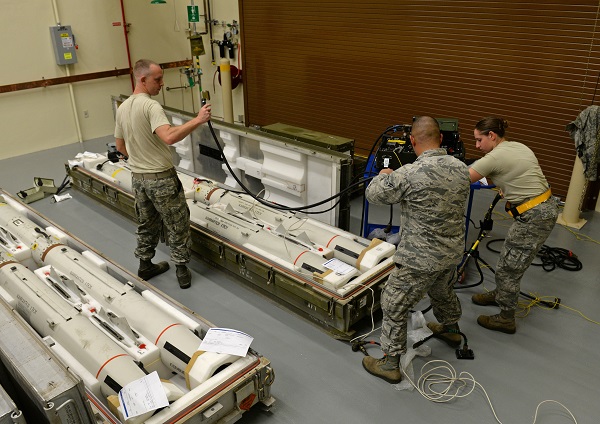Top news stories of 2022: The Ukraine War
6 min read
From left, U.S. Air Force Staff Sgt. Jeffrey Davies, Airman 1st Class Richard Melton and Staff Sgt. Stephanie Dahl, 36th Munitions Squadron, test an AGM-88 high-speed anti-radiation missile (HARM) in Andersen’s new Precision Guided Munitions building Jan. 26, 2017, at Andersen Air Force Base, Guam. Andersen AFB, with its strategic location and Pacific Command’s Continuous Bomber Presence, has the largest stockpile of munitions in the Pacific Air Forces. (U.S. Air Force photo by Senior Airman Alexa Ann Henderson)
Eugene resident Dan Pulju ran as the peace candidate for the United States Senate in 2022. Among his top stories this year is the Ukraine war.
[00:00:08] Dan Pulju: The part of the United States in the Ukraine War is more of an economic role. It’s waging an economic war. Its first response and its main response was sanctions that have basically harmed everyone around the world. It’s kind of like suppressing the world economy and driving it into collapse. And it seems like they’re hoping that it’ll collapse more in Russia and it will certainly collapse more in Western Europe. And of course the global South is already being harmed by that.
[00:00:38] They’re kind of like using it as a sandbox experiment and they do this with a lot of wars. They’ve done this with the Middle East for decades. They just have these proxies where they say, ‘All right, we’re going to pit our weapons against their weapons in a carefully controlled experiment.’ So they’re not going to go too far to where they can’t control it anymore by giving Ukraine weapons that it can have too much of an effect with. They’re just trying to prolong it.
[00:01:03] They’re testing a whole lot of their weapons systems. They sent a ton of munitions, all kinds, there’s shells for everything.
[00:01:12] What they’ve revealed publicly, they haven’t sent any tanks or manned fighter aircraft, and they’re probably not going to, but a lot of the public knows that they sent M777 Howitzers and the HIMARS rocket systems, highly mobile artillery rockets.
[00:01:28] They can take different kind of rockets and so they sent them ones with about a 75-km range. They have other ones that can go 300 km, but they haven’t sent them and they’re probably not going to, because if they do, the war will be escalated to what I figure would be a level beyond their control.
[00:01:47] Recently they sent an anti-radar missile called the HARM 88 Anti Ground Missile (AGM). And those are launched by Ukraine’s Air Force, which is dwindling in number, but they have about 40 MiG-29s left. And the Pentagon modified their MiG-29s to launch this missile to the NATO standards to launch it.
[00:02:08] They also sent them a lot of counter-battery radars, a whole lot. I know this because the Russians keep mentioning destroying them, and they mention like two or three every week and for several months they’ve been mentioning this. And most of the frontline battle is just kind of artillery fights.
[00:02:25] And the United States provided Ukraine with the radars they needed to stay in that fight and to just kind of keep the line stable. So they’re not really going anywhere.
[00:02:35] Except there’s a very slow battle going on in Bakhmut, where Wagner PMC, which is a private militia in Russia, has been, since late summer, working to encircle that city. And they’re getting pretty close to it and it’s a very, very bloody battle, like extremely high casualties.
[00:02:56] The drones have been a game-changer. And Iran actually was the driving force behind coming up with drones that could evade conventional air defenses. They said, ‘Well, let’s build really small drones but really long range that can go 1,000 km and they can carry enough ordnance to make a big explosion.’
[00:03:17] The Houthis in Yemen started developing the same drones and they were able to send them way well north of the border into Saudi Arabia and hit oil fields, like the well-known one was the Aramco oil field where they got some drones up there and caused a lot of damage.
[00:03:35] The drones are inexpensive, they’re hard to target, they claim to shoot down a lot of them, but then all the reports come of what got hit and what got destroyed. They can’t get them. They have no way to target them.
[00:03:47] They publish videos of people trying to shoot them down with small arms, with automatic rifles. But they fly at such low altitude, they’re too small to get. I have actually seen a video, two rounds missed. Actually one flew right by it. The other one exploded some distance behind it but didn’t destroy it. It wasn’t badly damaged and it kept flying. And this was from video on the drone itself.
[00:04:13] They may be able to get them with MANPADS, but to do that, you got to know they’re coming. They hear them. They hear them all the time. Like residents, just people in Ukraine will film on their cameras, the drones and the missiles, the cruise missiles. Of course, they go low and very fast and they hear them coming. They’ll take videos of just a miss going zip right over their head and you just hear the sound.
[00:04:34] During the latter stages of the Cold War during the arms race, the Reagan administration was saying, ‘We’ll just outproduce them till they have to give up, ‘cause they can’t build as, spend as much on the military as ours.’ So their job was to build originally a giant Soviet-fighting army, and then the Soviets quit.
[00:04:55] So what do you do if you have a giant army that is not opposed by anyone? Well, that giant army, it doesn’t have to be anyone’s in particular idea, it is just going to naturally morph into becoming an empire and saying, ‘Well, you have this big army. Go rule. Go take everything over.’
[00:05:13] And so that is just naturally what this leviathan of our military bureaucracy, and there’s massive other corporate influence that’s been added to it at this point, but it’s—this government itself goes beyond any one individual or any group of individuals to where it’s just an entity unto itself. It is a world-ruling machine.
[00:05:38] And I think the danger is that no one really does control it. It just kind of operates on its own. And the weakness, of course, is that bureaucracy is being undirected by individuals and having this kind of inertia, this will of its own, it is also weak and it moves like a blob. Being undirected, it can be defeated by actual thinking people that think strategically.
[00:06:04] The motivation that I’m hoping is going to happen in the United States, is people realizing that this world-domination machine is dominating the American populace here, just like it’s dominating people around the world. And that wakes people up, to where their own self-interest gets involved. Easy to be on the winning side, but then you realize that the side you thought was yours is actually against you.
[00:06:34] Because people in the United States are also suffering economically from this, it affects them personally. And in politics every voter has a right to focus on what’s important to them, their self-interest, they care about their pocketbook issues, and I was hoping that the economy would affect them personally soon enough to have an impact on the elections of this year.
[00:07:02] And it didn’t, and it might not ever, because elections have gotten so sophisticated now, in terms of who manipulates them, especially media control and the infiltration of social media to reestablish that level of control that used to exist only on television and certain newspapers.
[00:07:23] And they get people wrapped up into just jumping down this rabbit hole of who’s going to win, and they start rooting for one side or the other and they don’t even care that how many people are getting killed. The slipup of the EU official—European Union—who mentioned that they had 100,000 KIA (killed in action), Ukraine, is pretty much true. It’s true and it’s tragic and people in their armchairs, they don’t really understand what’s going on.
[00:07:53] And about half of the populace is aware that we’re just, like, kind of destroying ourselves with a mad crusade to destroy Russia in this proxy war. They’re willing to do something about it, but they don’t know what to do…
[00:08:06] John Q: Selecting the Ukraine War as one of the top stories of the year, Eugene resident and 2022 U.S. Senate candidate Dan Pulju.







